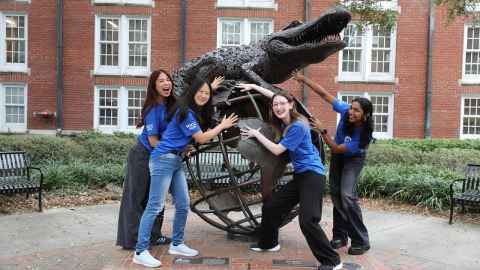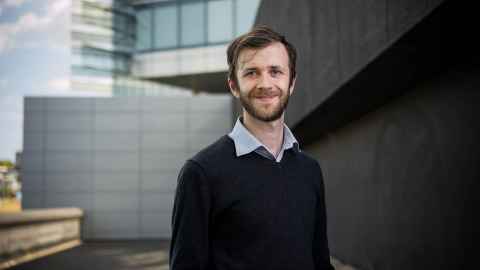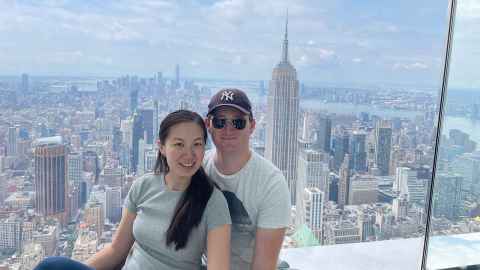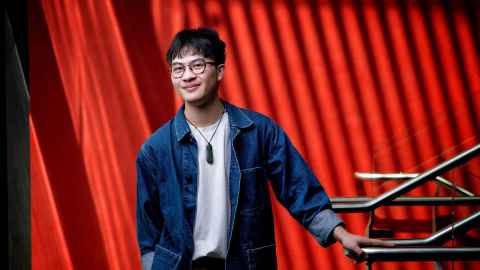Making the business case
3 June 2025
Feature: For more than two decades, University of Auckland student competitors have been dominant in global competitions that solve real business problems. Anthony Doesburg finds out what makes the Case Programme so successful.

Alumni of a University of Auckland business competition programme have a ready response for potential employers who ask about their real-world experience: they have a tonne of it.
And the challenges that are thrown at participants in the Business School’s Case Programme can get pretty real. Early this year, for example, within weeks of Donald Trump moving into the White House, four Auckland students were tasked with helping a billion-dollar company, many of whose customers were in the new US President’s crosshairs.
Under the tutelage of the University’s Case Programme manager, Cameron Haworth, they were in Florida competing with student groups from around the world to come up with the best way for Intermex, a migrant money-transfer business, to adapt to the US’s new political reality.
“Intermex is facing challenges with both the changes coming from the Trump Administration and general technological issues,” says Cameron.
With undocumented – and typically unbanked – Mexican migrants one of the groups in President Trump’s sights, Intermex sees opportunity in availing more people of its digital services.
“Many of its existing customers don’t have access to bank accounts and are potentially undocumented citizens. So, it is looking to adapt and mitigate this risk by creating more accessible digital offerings.”
And part of that involved drawing on the combined brain power of 56 highly motivated apprentice analysts for potential solutions.
They’d come together at the Heavener International Case Competition, staged by the University of Florida’s Warrington College of Business in Gainesville. At the end of the event, Intermex’s operations chief, a competition judge, took away the students’ suggested remedies to present to the company’s board.
Most of the students we’ve trained for these events end up in top consulting firms
or other businesses around the world working on similar problems.
Auckland Case Programme competitors, who are drawn from faculties across the University, excel at answering those kinds of tough questions (and some fun ones, too). In 22 years, they’ve placed in the top three in more than half of the 277 national and international contests in which they’ve competed.
Teams can be tested with cases relating to commercial or non-profit organisations from any country and market sector, says Cameron, who competed himself a decade ago as an undergraduate; he has also coached Auckland and Victoria University teams.
Students take part because they love a contest, he says, “but alongside that you have the massive knowledge gains from seeing how businesses and business strategy work, and problem solving. People find that exciting.”
Typical cases contain a good dose of reality, which often sets students on course for jobs requiring them to solve actual problems, not unlike those they’ve cut their teeth on in competitions.
“Most of the students we’ve trained for these events end up in top consulting firms or other businesses around the world working on similar problems,” says Cameron.

He took on his current role in 2024, from Auckland’s Case Programme founder, Brendon Potter.
Under Brendon’s watch, nearly 800 students took part in the programme, which he is now personally funding to the tune of $10,000 a year for five years. He is also coaching a team.
It’s clear he believes in the programme’s impact: “The participants have a one-on-one relationship with the programme manager that lasts more than four years, the average time they’re involved. By the end, Cameron will be the person they know best among faculty.”
While students are initially attracted by learning about business strategy, competition and the chance of international travel, says Brendon, they soon discover the programme is about self-awareness, teamwork and challenging themselves.
“As corny as it sounds, while I was running the programme, I thought of myself as lighting rockets that travel into the future to make the world a better place.”
Propelling global careers
Alumni launched on notable trajectories include Chris Jenkins, who helped shape the post-Brexit Irish-British border; Nelson Lam, an assistant professor of chemistry and leader of a lab at the University of Victoria in British Columbia; fashion designer Victoria Holyoake; and Micah Hill-Smith, co-founder of Sydney and San Francisco-based AI start-up Artificial Analysis.
I thought of myself as lighting rockets that travel into the future to make the world a better place.
Alumna Meili Bunning, an economics and finance graduate who was at the University from 2009 to 2012, describes the programme as life changing.
“It helped me build a foundational set of skills and resumé experience upon which every subsequent career or academic milestone has been built,” she says.
Shanghai-born Meili’s career curve has landed her, via consultancy McKinsey, in New York at multibillion-dollar financial services firm Citadel Securities, where she is chief operating officer of retail market-making.

She took part in the Business School’s first-year students’ Case competition, after which she joined the IEL Development Programme (named after Industrial Equity Ltd, the firm of long-time programme supporter Raymond Webb).
DEVO, as it’s called, is a five-week boot camp open to students of any faculty who are members of the University of Auckland Case Club (formerly the Management Consulting Club or MCC). It focuses on personal development and building practical business knowledge through team-based problem solving.
“I was closely involved with all things MCC for the rest of my time at university,” says Meili.
Partly it was the lure of new friendships and potential international travel, both of which came to pass; she recalls being taken surfing at Sentosa Island while part of an Auckland team competing at Singapore Management University.
And it was through DEVO that she met Chris, now her husband with whom she has two young children. A finance and accounting graduate who has worked at Barclays Investment Bank for 14 years, Chris was drawn to the competition to set himself apart in a tight Auckland investment-banking job market.
“I realised there were a lot of business students with good grades competing for a handful of roles,” says Chris.
Meili and Chris urge students University-wide to get involved in the Case Programme for personal development, networking and, says Chris, “to stand out from the pack when applying for jobs”.
They keep in touch with the programme; Meili coached teams while back in New Zealand for a year before Covid, and they’ve met with Brendon and teams as they’ve come through New York.
The MCC was also central to law and commerce graduate Jenny Yan Li Liu’s time at the University. The now Melbourne-based Bain & Company consultant was club co president in 2019, when she led a committee of more than 20 people running about a dozen on-campus Case competitions.
“It was a massive learning experience in leadership and event management,” says the 29-year-old.
She was also an eager competitor. One of her most memorable events, she says, was an international contest for 12 teams hosted by the University of Auckland, called the Champions Trophy.
It was a massive learning experience in leadership and event management.
“It was particularly special because I had been involved in organising it in previous years, so finally getting the chance to compete in it was both exciting and rewarding. I had an amazing team, some of whom I’m still close friends with today, and the competition struck the perfect balance between fun and competitiveness. I think it’s one of the best-run competitions on the circuit.
“Beyond that, I had the chance to take part in six other competitions in the US, Singapore, Thailand and Australia – an incredible experience as a student. Even if you don’t intend to go into consulting, the skills you gain through the Case Programme are highly transferable and valuable in any industry.”
Hard and soft skills
Callum Sng, who graduated last June with a BA in economics and statistics and a BCom in marketing, credits the programme with helping him land his job as a Hong Kong-based strategy and product specialist at Jane Street, a quantitative trading firm.

He describes going with a friend to an introductory night at the MCC as “probably one of the most defining decisions I made during my time at university”. It led him to do DEVO, and then to take part in a head-to-head Case competition against AUT. He later entered the National League Case circuit, which features most of the country’s universities (the Auckland team came first in both).
He was also selected for an Auckland team to compete at the 2023 Chulalongkorn International Business Case Competition in Thailand. This included a 24-hour case that grappled with the question ‘how can we get Phuket to net-zero carbon emissions by 2040?’.
“It was easily the most challenging case I had come across but it was an exciting problem to investigate that really pushed our team to its limits. I hung up the towel after that event and spent my final two semesters supporting our prospective members as a coach for our development programme,” he says.
Callum says he went into the Case Programme intent on excelling, “which made me prone to imposter syndrome and overworking”. However, Brendon’s leadership “made it clear from the beginning that health and well-being was number one”.
Through the programme Callum says he learnt the value of not taking himself too seriously and living a balanced lifestyle.
“It has been incredibly transformative.”
Not all cases are of a knotty geopolitical or climate-related nature.
Jonathan Chisholm, another Auckland programme alumnus and an associate in the investment team at BGH Capital in Melbourne, recalls placing third in a University of Hong Kong competition looking at a case on K-pop [Korean pop music]. When the finals were done, all the competitors let off steam by sampling Hong Kong’s nightlife.
It wasn’t all just fun and games though, says Jonathan.
“Involvement in the programme was a key enabler for me to land internships and graduate roles in investment banking and management consulting, both as a recognisable experience on my CV and through the skills it developed.
“It made a huge difference to my skill set coming out of university and provided travel and experiences I otherwise would not have had.”
And he came away with many enduring friendships.
“Case is an excellent group of people to be involved with.”
This article first appeared in the Autumn 2025 issue of Ingenio.